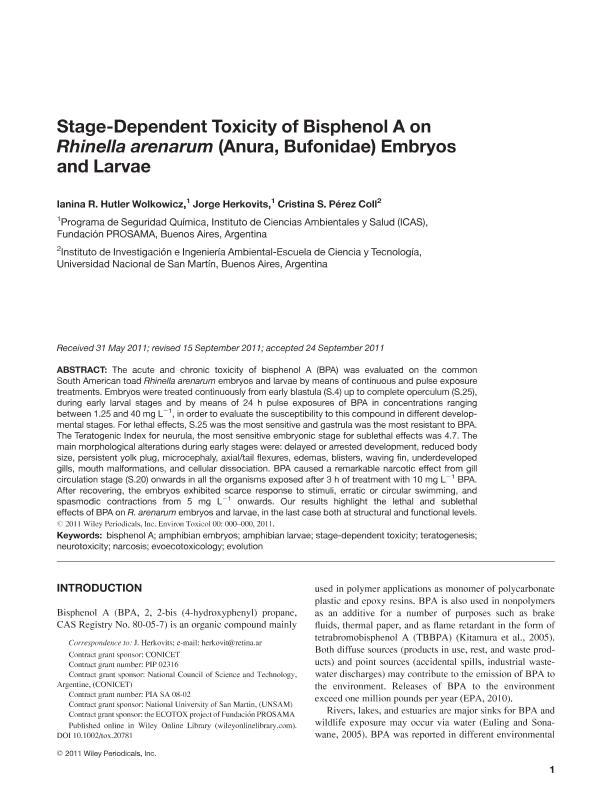Mostrar el registro sencillo del ítem
dc.contributor.author
Hutler Wolkowicz, Ianina Ruth

dc.contributor.author
Herkovits, Jorge

dc.contributor.author
Perez Coll, Cristina Silvia

dc.date.available
2018-01-08T21:50:24Z
dc.date.issued
2011-11
dc.identifier.citation
Herkovits, Jorge; Hutler Wolkowicz, Ianina Ruth; Perez Coll, Cristina Silvia; Stage dependent toxicity of Bisphenol A on Rhinella arenarum (Anura, Bufonidae) embryos and larvae; Wiley; Environmental Toxicology; 29; 2; 11-2011; 146-154
dc.identifier.issn
1520-4081
dc.identifier.uri
http://hdl.handle.net/11336/32609
dc.description.abstract
The acute and chronic toxicity of bisphenol A (BPA) was evaluated on the common South American toad Rhinella arenarum embryos and larvae by means of continuous and pulse exposure treatments. Embryos were treated continuously from early blastula (S.4) up to complete operculum (S.25), during early larval stages and by means of 24 h pulse exposures of BPA in concentrations ranging between 1.25 and 40 mg L−1, in order to evaluate the susceptibility to this compound in different developmental stages. For lethal effects, S.25 was the most sensitive and gastrula was the most resistant to BPA. The Teratogenic Index for neurula, the most sensitive embryonic stage for sublethal effects was 4.7. The main morphological alterations during early stages were: delayed or arrested development, reduced body size, persistent yolk plug, microcephaly, axial/tail flexures, edemas, blisters, waving fin, underdeveloped gills, mouth malformations, and cellular dissociation. BPA caused a remarkable narcotic effect from gill circulation stage (S.20) onwards in all the organisms exposed after 3 h of treatment with 10 mg L−1 BPA. After recovering, the embryos exhibited scarce response to stimuli, erratic or circular swimming, and spasmodic contractions from 5 mg L−1 onwards. Our results highlight the lethal and sublethal effectsof BPA on R. arenarum embryos and larvae, in the last case both at structural and functional levels.
dc.format
application/pdf
dc.language.iso
eng
dc.publisher
Wiley

dc.rights
info:eu-repo/semantics/openAccess
dc.rights.uri
https://creativecommons.org/licenses/by-nc-sa/2.5/ar/
dc.subject
Bisphenol A
dc.subject
Amphibian Embryos
dc.subject
Stage Dependent Toxicity
dc.subject
Teratology
dc.subject.classification
Otras Ciencias Biológicas

dc.subject.classification
Ciencias Biológicas

dc.subject.classification
CIENCIAS NATURALES Y EXACTAS

dc.title
Stage dependent toxicity of Bisphenol A on Rhinella arenarum (Anura, Bufonidae) embryos and larvae
dc.type
info:eu-repo/semantics/article
dc.type
info:ar-repo/semantics/artículo
dc.type
info:eu-repo/semantics/publishedVersion
dc.date.updated
2018-01-08T19:49:20Z
dc.identifier.eissn
1522-7278
dc.journal.volume
29
dc.journal.number
2
dc.journal.pagination
146-154
dc.journal.pais
Estados Unidos

dc.journal.ciudad
Nueva York
dc.description.fil
Fil: Hutler Wolkowicz, Ianina Ruth. Consejo Nacional de Investigaciones Científicas y Técnicas; Argentina. Fundación Pro Salud y Medio Ambiente. Instituto de Ciencias Ambientales y Salud; Argentina. Fundación Pro Salud y Medio Ambiente. Programa de Seguridad Química; Argentina
dc.description.fil
Fil: Herkovits, Jorge. Consejo Nacional de Investigaciones Científicas y Técnicas; Argentina. Fundación Pro Salud y Medio Ambiente. Instituto de Ciencias Ambientales y Salud; Argentina. Fundación Pro Salud y Medio Ambiente. Programa de Seguridad Química; Argentina
dc.description.fil
Fil: Perez Coll, Cristina Silvia. Universidad Nacional de San Martín. Instituto de Investigación e Ingeniería Ambiental; Argentina. Universidad Nacional de San Martín. Escuela de Ciencia y Tecnología; Argentina. Consejo Nacional de Investigaciones Científicas y Técnicas; Argentina
dc.journal.title
Environmental Toxicology

dc.relation.alternativeid
info:eu-repo/semantics/altIdentifier/doi/http://dx.doi.org/10.1002/tox.20781
dc.relation.alternativeid
info:eu-repo/semantics/altIdentifier/url/http://onlinelibrary.wiley.com/doi/10.1002/tox.20781/abstract
Archivos asociados
